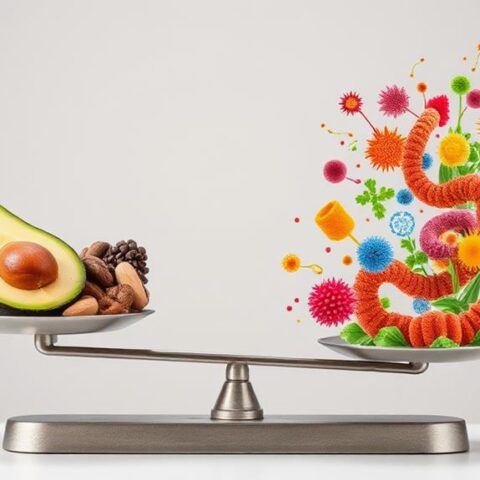
Lemons are indeed a low-carb fruit option, containing only 3.7 grams of net carbs per medium-sized fruit. Their carb content is notably lower than other citrus fruits, with oranges containing 12.8 grams and grapefruits 8.1 grams per serving. Fresh lemon juice provides just 1 gram of net carbs per tablespoon, while lemon zest adds minimal carbs at 0.4 grams per whole lemon. Understanding the specific nutritional components of lemons reveals their versatile role in low-carb meal planning.
Key Takeaways
- Lemons are low-carb friendly with only 3.7 grams of net carbs per medium fruit, making them suitable for keto and low-carb diets.
- Lemon juice contains just 1 gram of net carbs per tablespoon, while zest adds minimal carbs at 0.4 grams per whole lemon.
- Compared to oranges (12.8g) and grapefruits (8.1g), lemons have significantly fewer net carbs, making them a better citrus choice.
- Fresh lemons provide essential vitamin C, potassium, and antioxidants while keeping carb content minimal at 5.4 grams total carbohydrates.
- Lemon zest and juice can enhance low-carb recipes without significantly impacting carb counts, perfect for dressings, marinades, and beverages.
Understanding Lemon's Carbohydrate Content
Lemons, a citrus staple in many kitchens, contain surprisingly few carbohydrates for those following a low-carb lifestyle. A medium-sized lemon contains just 5.4 grams of total carbohydrates, with 1.6 grams of dietary fiber, resulting in only 3.7 grams of net carbs. This makes it an excellent choice for those monitoring their carbohydrate intake.
For individuals following a keto diet, which typically restricts daily carbs to 20-50 grams, lemons offer flavor without compromising nutritional goals. The fruit's versatility extends to its various components, with one tablespoon of juice containing approximately 1 gram of net carbs, while the zest provides merely 0.4 grams per lemon.
This minimal carbohydrate content allows for generous use in cooking and flavoring while maintaining strict dietary requirements.
The Net Carbs in Different Lemon Portions
The net carbohydrate content of lemons varies considerably between fresh and dried forms, with dried versions typically containing more concentrated carbs per serving.
Understanding common serving measurements helps track carb intake effectively, from the 3.8 grams in a medium fresh lemon to the 1 gram in a tablespoon of juice.
Home cooks and dieters can make informed choices by measuring lemon portions accurately, whether using the whole fruit, juice, or zest in their low-carb meal preparations.
Fresh Vs Dried Lemons
Understanding the carbohydrate content between fresh and dried lemons becomes essential when adhering to a low-carb dietary plan.
Fresh lemons are naturally low in carbs, containing approximately 5.4 grams of total carbohydrates per medium fruit, with 1.6 grams of fiber reducing the net carb impact. The versatile lemon zest provides concentrated flavor while contributing only 0.4 grams of net carbs per lemon.
In contrast, dried lemon peel contains considerably more carbohydrates, with 22 grams of total carbs per 100 grams. This substantial difference makes fresh lemons the preferred choice for low-carb diets.
When using lemon juice, one tablespoon contains just 1 gram of net carbs, offering a practical way to enhance flavors while maintaining carb restrictions.
Common Serving Measurements
Measuring net carb content across different lemon portions helps individuals make informed decisions while following low-carb eating plans. A medium-sized lemon contains approximately 5 grams of net carbs, while a single tablespoon of lemon juice contributes only 1 gram to the total carb count.
For those seeking minimal carbohydrate impact while maximizing nutritional benefits, lemon zest proves particularly valuable, containing just 0.4 grams of net carbs per whole lemon's worth.
Individual lemon slices and teaspoons of lemon juice offer even more precise portion control for low-carb diet adherents, with 0.3 grams of net carbs each. These measurements enable people to incorporate lemons' bright flavors and health benefits into their meals while maintaining strict carbohydrate limits, making them a versatile addition to any low-carb eating plan.
Health Benefits of Adding Lemons to Low-Carb Diets
Incorporating lemons into a low-carb diet offers multiple health advantages, including significant immune system support through their high vitamin C content and powerful antioxidant properties.
The citrus fruit's natural acids enhance digestive health by stimulating the production of digestive juices and supporting proper nutrient absorption, which can be particularly beneficial when shifting to a low-carb eating pattern.
Additionally, lemons contribute to weight management efforts by promoting feelings of satiety, reducing cravings through their flavor-enhancing qualities, and supporting metabolic functions without adding significant carbohydrates to the daily intake.
Immune System Support Benefits
When following a low-carb diet, the addition of lemons can provide remarkable immune system benefits while maintaining ketogenic goals. With only 3.7 grams of net carbs per medium lemon, these citrus fruits deliver substantial vitamin C and antioxidants that strengthen immune function and combat inflammation.
The citric acid in lemons helps maintain ideal pH balance, supporting overall immune resilience while enhancing the absorption of iron from plant-based foods.
- A medium lemon provides 30% of the daily recommended vitamin C intake, helping reduce cold duration and severity
- Flavonoid antioxidants found in lemons fight free radicals and decrease inflammation
- Citric acid promotes iron absorption from plant sources, preventing anemia and supporting immune health
These immune-boosting properties make lemons an excellent addition to any low-carb eating plan, offering substantial health benefits without compromising dietary restrictions.
Digestive Health Enhancement Properties
Beyond their immune-boosting properties, lemons offer significant digestive health benefits that align perfectly with low-carb dietary goals. With 1.6 grams of dietary fiber per medium lemon, they support regular bowel movements and promote ideal gut health.
The citric acid content stimulates gastric acid production, enhancing nutrient absorption and overall digestion.
Lemons play a crucial role in addressing common digestive issues by improving enzyme function and reducing bloating. Their antioxidant compounds, particularly flavonoids, help decrease inflammation in the digestive tract, contributing to better gut health.
For those following a low-carb diet, incorporating lemons not only adds flavor but also supports the body's natural detoxification processes through improved liver function, making them an excellent addition to any health-conscious eating plan.
Weight Management Promoting Effects
Lemons emerge as powerful allies in weight management efforts, particularly for those following low-carb dietary protocols. With only 3.31 grams of net carbs per medium lemon, these citrus fruits support weight management through multiple mechanisms. Their high vitamin C content helps reduce cravings while their natural compounds enhance flavor without adding significant calories to meals.
- The combination of antioxidant properties and digestive benefits supports metabolic function and reduces inflammation.
- Low net carbs content makes lemons compatible with strict low-carb diet requirements.
- Natural acids in lemons aid digestion and promote efficient nutrient absorption.
The metabolic advantages of lemons extend beyond their low carbohydrate content, making them valuable for those seeking sustainable weight management solutions through dietary modification.
Their ability to enhance meals while supporting health objectives positions them as strategic additions to low-carb eating plans.
Best Ways to Use Lemons While Staying Low-Carb
Making the most of lemons on a low-carb diet requires strategic preparation and incorporation into meals, as these versatile citrus fruits offer exceptional flavor while contributing minimal carbohydrates to one's daily intake.
With only 3.7 grams of net carbs per medium lemon, there are numerous ways to enhance dishes while maintaining dietary goals. Incorporating lemon zest provides intense flavor with merely 0.4 grams of net carbs, while fresh lemon juice can be used in keto-friendly salad dressings and marinades at just 1 gram per tablespoon.
For ideal hydration, adding lemon slices to water or tea creates a rejuvenating, carb-conscious beverage. Those craving sweets can combine lemon juice with alternative sweeteners to craft satisfying low-carb desserts without compromising their nutritional targets.
Essential Vitamins and Minerals in Lemons
Lemons stand out as a powerhouse of essential nutrients, with vitamin C leading the nutritional profile at 30% of the daily recommended value per medium fruit.
The citrus fruit delivers a significant dose of potassium for cardiovascular support, along with trace amounts of calcium and magnesium that contribute to bone health and metabolic function.
Beyond these core minerals, lemons contain folate for cellular health and powerful antioxidants that work together to strengthen the immune system and reduce inflammation throughout the body.
Key Nutrients Breakdown
While often celebrated for their invigorating taste, these citrus powerhouses pack an impressive array of essential nutrients that make them particularly valuable in a health-conscious diet.
Lemons are exceptionally rich in vitamin C, providing 30% of the daily recommended value, while maintaining a low net carb profile suitable for ketogenic diet followers. Their notable potassium content of 116mg per medium fruit supports cardiovascular health, while dietary fiber aids digestion and promotes satiety.
- Contains essential B vitamins, including folate and B6, supporting energy metabolism
- Rich in antioxidant flavonoids that combat oxidative stress
- Provides approximately 1.6 grams of fiber per fruit, supporting digestive health
These nutrients work synergistically to enhance overall health while keeping carbohydrate intake minimal, making lemons an excellent addition to a low-carb lifestyle.
Immune System Benefits
The remarkable vitamin C content found in lemons serves as a cornerstone for immune system support, acting as a powerful defender against various pathogens and environmental stressors. This immune-boosting fruit provides approximately 30% of the daily vitamin C requirement in just one medium-sized lemon, while its antioxidant compounds, particularly flavonoids, work to reduce inflammation and protect cellular function throughout the body.
Beyond vitamin C, lemons contain essential minerals like potassium and magnesium that contribute to overall health by maintaining proper cellular activities and blood pressure regulation.
The fruit's natural antibacterial properties further enhance its immune-supportive role, while its high vitamin C content promotes collagen production, strengthening the body's protective barriers against infections and supporting peak immune system performance.
Low-Carb Recipe Ideas Using Lemons
Several creative low-carb recipes can harness the bright, versatile qualities of lemons without compromising dietary goals.
Lemon juice and zest, containing minimal net carbs, offer exceptional flavor enhancement opportunities for low-carb dishes. Combining lemon juice with healthy fats like olive oil creates delicious low-carb salad dressings, while using lemons to marinate proteins results in tender, flavorful meals.
- Prepare invigorating lemon-infused water by adding fresh lemon slices, providing hydration with negligible carbohydrates.
- Create zesty marinades for chicken or fish using lemon juice, herbs, and olive oil, keeping dishes low in carbs while maximizing flavor.
- Incorporate lemon zest into low-carb baked goods and desserts, adding bright citrus notes with only 0.4g net carbs per whole lemon's worth of zest.
- Consider using keto-friendly sweeteners like stevia or erythritol to enhance lemon desserts without disrupting ketosis.
Comparing Lemons to Other Citrus Fruits
Among citrus fruits commonly available, lemons emerge as a standout choice for low-carb dieters due to their minimal carbohydrate content and versatile culinary applications.
With just 3.31 grams of net carbs per medium-sized fruit, lemons contain considerably fewer carbohydrates than other citrus options while delivering substantial vitamin C and antioxidants.
When compared to other citrus fruits, the differences in carb content become clear. Limes follow with 5.2 grams of net carbs per 100 grams, while grapefruits contain 8.1 grams per half fruit.
Oranges have the highest carb content at 12.8 grams per small fruit, making them less suitable for strict low-carb diets. This notable variation in nutritional value positions lemons as an ideal choice for those monitoring their carbohydrate intake while seeking the benefits of citrus fruit.
Managing Lemon Portions on a Low-Carb Diet
Successful integration of lemons into a low-carb diet requires careful attention to portion sizes and measurement techniques. While lemons can enhance flavor in meals, monitoring portions is crucial since a medium lemon contains about 5 grams of net carbs per fruit.
Those following ketogenic diets must be particularly vigilant, as their daily carb limits often range between 20-50 grams.
- One tablespoon of lemon juice contains approximately 1 gram of net carbs, making it a measured way to add citrus flavor.
- Lemon zest offers concentrated flavor with only 0.4 grams of net carbs per lemon.
- Using measuring tools guarantees accurate serving sizes and helps maintain adherence to low-carb goals.
Scientific Research on Lemons and Blood Sugar
Scientific investigations have revealed compelling evidence about the beneficial relationship between lemons and blood sugar regulation.
Research demonstrates that lemons possess unique properties that support glycemic control, particularly valuable for those following a low-carb diet. Studies show that vitamin C in lemons helps improve insulin sensitivity, while their natural citric acid content slows carbohydrate digestion, resulting in more stable blood sugar levels after meals.
Packed with vitamin C and citric acid, lemons naturally support blood sugar control by enhancing insulin sensitivity and slowing carbohydrate digestion.
The antioxidants found in lemons also play an essential role in combating oxidative stress and inflammation, two factors commonly associated with insulin resistance.
In addition, clinical observations indicate that incorporating lemon juice during meals can effectively reduce post-meal blood glucose spikes, making lemons a scientifically-supported addition to blood sugar management strategies.
Tips for Selecting and Storing Fresh Lemons
Selecting and storing fresh lemons properly can greatly impact their flavor, longevity, and nutritional benefits in a low-carb diet. When choosing fresh lemons, opt for bright yellow fruits that feel heavy for their size, indicating ideal ripeness and juiciness.
To preserve freshness, store lemons in the refrigerator's crisper drawer, where they can maintain quality for up to four weeks.
- Check for firmness and avoid lemons with soft spots or blemishes, which may indicate deteriorating quality.
- Wrap cut lemons tightly in plastic wrap to prevent moisture loss and extend shelf life.
- Grate lemon zest just before use to guarantee maximum flavor, as exposure to air diminishes its aromatic properties.
For best results in low-carb cooking, proper storage and selection techniques guarantee lemons maintain their vibrant flavor and nutritional benefits.
Frequently Asked Questions
Is Lemon Good for a Low Carb Diet?
Lemons support low carb diets with minimal net carbs, abundant antioxidant properties, and versatile culinary uses. Their juice offers nutritional benefits while enhancing recipes and detox drinks without compromising health or weight loss goals.
Is Lemon Zest Keto Friendly?
Lemon zest offers ideal keto benefits with minimal carbs and maximum flavor-enhancing potential. Its nutritional value makes it perfect for various keto recipes, while providing health advantages through essential oils and antioxidants.
What Fruit Has the Lowest Carbs?
Among low carb fruits, avocados have the lowest net carbs at 1.3g per half fruit, followed by lemons at 3.7g, raspberries at 6.7g, strawberries at 8.2g, and blackberries at 10.2g.
Is Lemon Zest a Carbohydrate?
Lemon zest contains minimal carbohydrates, offering nutritional benefits with only 0.4g net carbs per lemon. Its concentrated flavor and health properties make it an excellent low-carb ingredient for various recipes and culinary uses.
Conclusion
Lemons prove to be an excellent addition to low-carb diets, containing minimal net carbs while offering substantial nutritional benefits. Their versatility in cooking, proven health effects, and rich vitamin C content make them a smart choice for those monitoring carbohydrate intake. By understanding proper portions and incorporating lemons strategically into meals, individuals can enhance their low-carb lifestyle while enjoying the bright, citrusy flavors and health-promoting properties these fruits provide.









No Comments